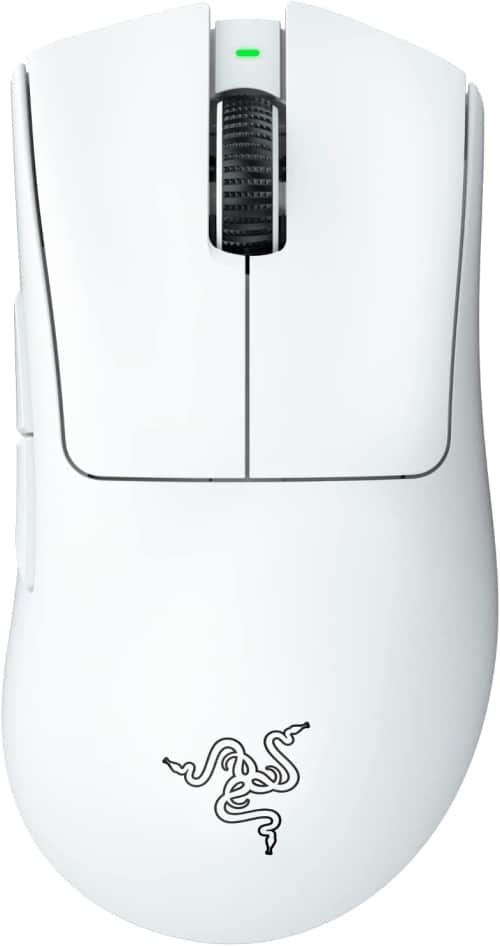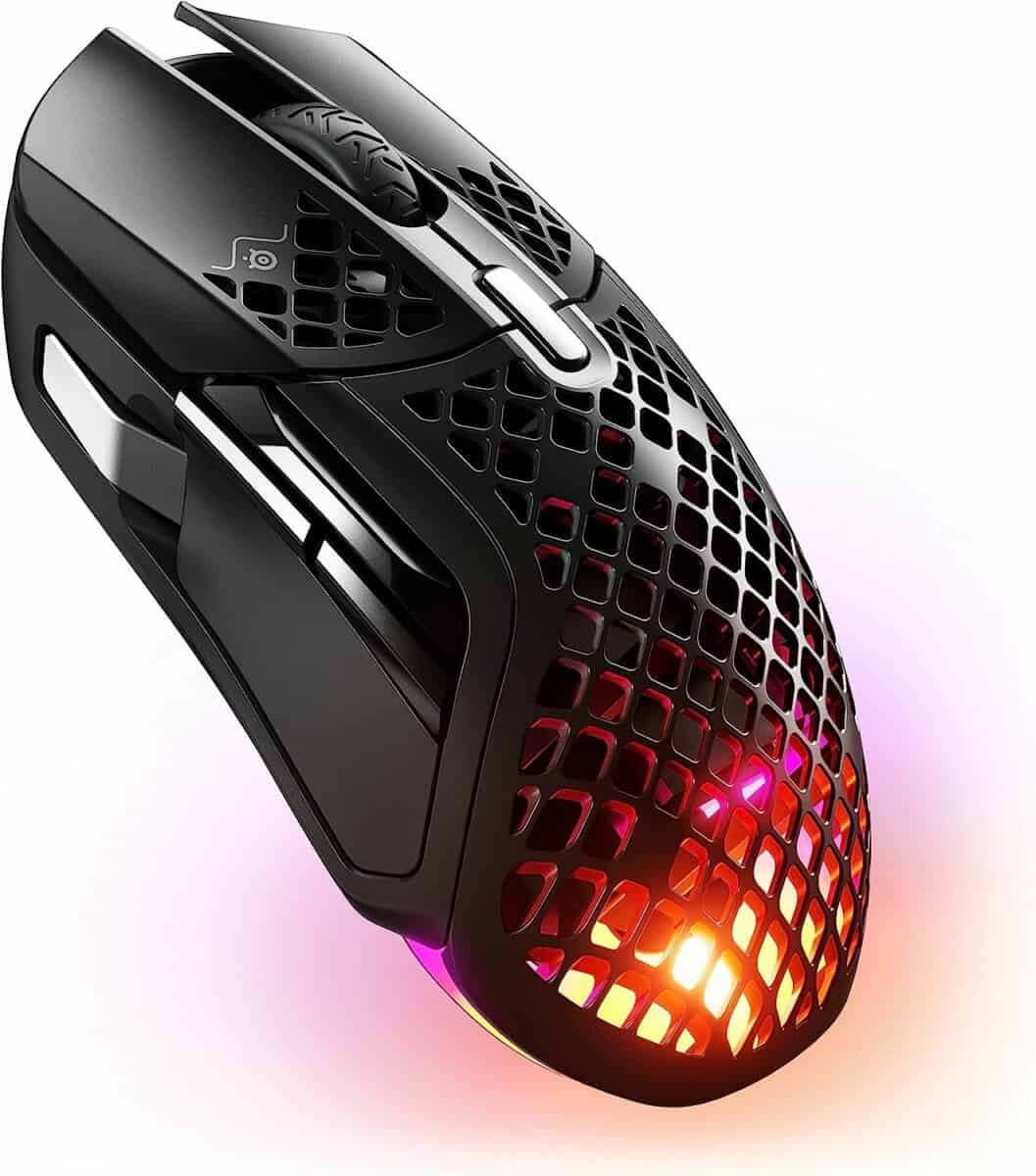Wired vs wireless gaming mouse – which should you choose in 2024?
Wired vs wireless gaming mouse? What are the differences and how do they affect gaming performance?

WePC is reader-supported. When you buy through links on our site, we may earn an affiliate commission. Prices subject to change. Learn more
Wired vs wireless gaming mouse, which is best? More specifically, which is the best for gaming? Well, as usual with simple queries like this, there are a lot of benefits and drawbacks, far more than you’d initially assume. So, we’re going to take you through everything you need to know so you can be confident in choosing to cut, or keep the cord in 2024. Considering some of the best gaming mice can feature both wired and wireless variants, it can be a hard choice.
It’s a question that has plagued many over the last couple of decades, with consumers struggling to decide whether or not the benefits of wireless technology actually outweigh the reduction in gaming performance, however small it may be. The gap between wired vs wireless gaming mice has now become much less apparent. Today’s mice come equipped with new technologies that offer Lightspeed connectivity and an almost unlimited amount of battery life – making wireless gaming mice more popular than ever before. Furthermore, wireless mice now bring fantastic gaming performance to the table that really does give their wired alternatives a run for their money.
Wired vs wireless gaming mouse video
With the current batch of high-performance gaming mice giving consumers the ultimate headache when deciding which one to choose, we thought we’d whip this article together explaining the differences between wired and wireless gaming mice. We’ll be looking at the main specifications that affect gaming performance, the main differences between the two technologies, and whether or not you should choose wired or wireless for your next gaming mouse purchase. First though, a video explanation.
Wired vs wireless gaming mouse – what’s the difference?
A lot of people will already understand the main difference between wired and wireless gaming mice – one uses a cable that you plug straight into a USB port and wireless mice connect via a wireless connection courtesy of either Bluetooth or a 2.4GHz USB dongle. Having said that, there are far more factors separating the two technologies than what’s visible to the naked eye. For people new to gaming mice that are unaware of the more intricate differences between the two technologies, below we’ve outlined the main pros and cons of both.
As you can see from the table above, while wireless technology has come a long way since its humble beginnings, there are still key differences seen when comparing the wired and wireless gaming mice of today. While that might sound negative towards wireless gaming mice, you’d be surprised how little the difference is when comparing gaming performance.
In years gone by, gamers had a pretty easy choice when it came to choosing a mouse. For example, if you played fast-paced FPS shooters or games that required pinpoint accuracy, you’d opt for a wired gaming mouse. People chose wired gaming mice because they offered lower input lag, zero interference, and were, more often than not, lighter in design – all huge factors that impact your gaming performance. Choosing a wireless mouse a decade ago was considered suicide when it came to competitive gaming.
That being said, fast-forward to the present day and we find ourselves in a time where wireless gaming mice are some of the best the market has to offer – equipped with the very same high-performance specs that we see in wired alternatives. Gone are the days when wireless mice were only considered for office or general use only. Today we have a huge catalog of high-performance gaming mice to choose from – only making your choice that much harder.
Pros and cons of wireless mice
As with everything PC-related, when making a choice between two technologies, there are inevitable trade-offs and concessions that you’ll have to endure in making your choices.
Wireless mouse pros
- Eliminates cable drag and snags, removing the need for a mouse bungee.
- Far better portability and convenience.
- More suitable for laptop use.
- More compatibility with wireless devices like tablets and phones, especially in the case of Bluetooth mice.
- Modern wireless gaming mice like the Razer Viper Ultimate and Corsair Sabre RGB Pro have a far longer range than older models.
- No cable improves desk aesthetics.
Wireless mouse cons
- Lower response time than wired.
- Can be prone to signal interference, especially if used on common wireless frequencies utilized by other transmitters like 2.4GHz.
- Less precision than wired.
- Wireless capabilities tend to make for heavier mice due to the battery and radio frequency transmitter.
Pros and cons of wired mice
So we’ve covered wireless mice, now let’s have a look at what you’ll be gaining and losing if you go for a wired gaming mouse.
Wired mouse pros
- Battery life as a concern is eliminated.
- RGB lighting can be utilized at all times without the worry of it affecting battery life.
- Wired versions of computer mice are cheaper than their wireless counterparts.
- Sensor info is less likely to be subject to interference than wireless mice.
Wired mouse cons
- Cable drag can be an issue unless paired with a mouse bungee
- Messier desk setup
Best wireless gaming mouse vs best wired gaming mouse
With that in mind, now’s probably a good time to compare the top players in the wired and wireless mouse categories. This should give you a better understanding of the pros and cons that these mice come to the table equipped with.
We’ll be putting the Logitech G Pro wireless, one of the world’s most popular gaming mice, up against the Razer Deathadder V2 – probably the most popular wired gaming mouse out there, even with V3 now here.
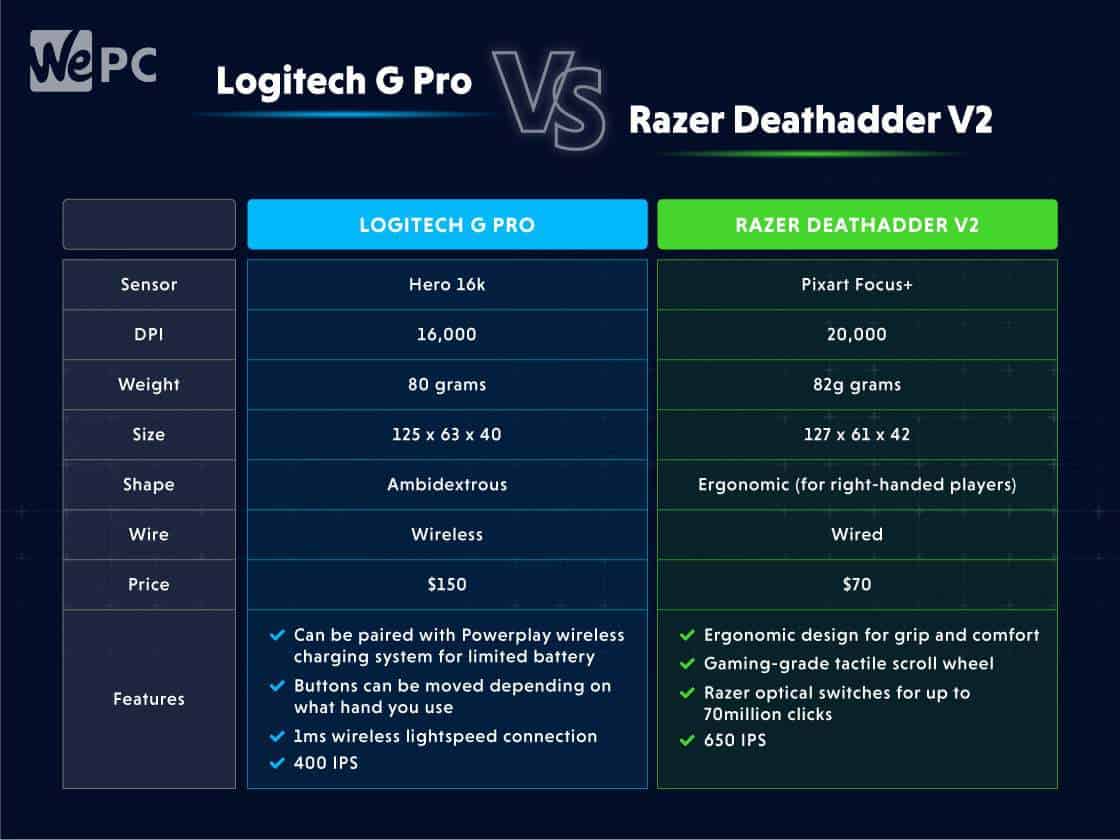
Upon first glance, you’re probably thinking to yourselves, there’s not a great deal of difference between the two mice – and you’d be right to think that. However, when you glance down at the price difference, you soon start to see why this decision becomes so difficult.
If we could measure price/performance in a reliable and accurate way, you would no doubt see the Razer Deathadder V2 destroy the G Pro when it comes to value for money.
The difference between the two sensors these mice are equipped with is basically unnoticeable – as is their size if truth be told. The only real benefit of the wireless gaming mouse at this stage is the lack of wires and the slight drop in weight – which, in this case, is 2 grams. Everything else is fairly similar.
Obviously, the Logitech G Pro comes equipped with a ton of additional features like swappable buttons and Powerplay support, but these are things that do not affect you as a gamer. When it comes down to raw performance on the gaming field, there really aren’t that many things that separate these two great gaming mice.
With all that in mind, it’s worth mentioning that as you work your way down the price spectrum, the difference in gaming performance starts to widen – with wired mice offering up far better sensors and build quality. If you take a closer look at mid-range and budget wireless mice, you start to see the sacrifices made by manufacturers to keep the price at manageable levels. And, unfortunately, it’s usually areas that affect gaming performance largely.
Gaming mouse tech specs
If at this stage of the article you’re scratching your head in confusion over some of the technical jargon used above, don’t worry, we’re going to explain what each technical specification means and how they can impact you as a gamer. So, with that in mind, let’s dive straight into it!
Sensor
When it comes to gaming mice, the number one most important tech spec when determining raw performance has to be the sensor. The sensor dictates how accurate the mouse is and how well it tracks your movements – two crucial elements when playing the majority of computer games.
Sensors have been subject to huge advancements over the past decade or so, with the current batch of gaming sensors offering flawless accuracy, excellent response, and durable life spans too. And while there aren’t that many sensors to choose from in today’s market, there is still a fairly large gap in performance when comparing the budget sensors to the high-end ones.
As a general rule of thumb, if you’re largely playing fast-paced shooters and FPS titles, you’re going to want to choose a mouse that offers the best possible sensor. For other game styles such as MMO, RPGs, and RTS, you don’t have to worry as much when it comes to your next mouse purchase.
DPI?
DPI, or dots per inch, is a simple way of measuring how sensitive a mouse can be – with a higher DPI offering higher sensitivity. While this is usually flaunted by manufacturers as a marketing tool, it doesn’t actually have a huge impact on your gaming performance.
So, what is DPI and why do companies never shut up about it? Well, the answer is exactly that. Manufacturers will use DPI as a large selling tool when it comes to gaming mice – with the latest offerings going as high as 20,000 DPI. If you are a newcomer to gaming mice, you might think 20,000 DPI sounds a whole lot better than 12,000. However, in a real-world situation, you probably won’t need higher than 1,200 – extreme cases may go to 2,000.
The bottom line is this, all sensors have the ability to provide more than enough sensitivity for your specific needs. Don’t get sucked in by the marketing of DPI.
Shape & design
The shape of a gaming mouse is the second most important feature it comes equipped with. As it has a huge impact on your in-game performance, you need to be choosing a gaming mouse that’s right for your grip style and hand size. If you choose a mouse that isn’t optimized for your hand size/grip style, you are putting yourself at a serious disadvantage when it comes to competitive gaming titles.
Wired and wireless mice come in a variety of different shapes and sizes, so finding one that’s right for your hand and grip can take a little figuring out. However, taking that time to make sure the mouse you buy is right for your grip and hand size could be the difference between winning and losing.
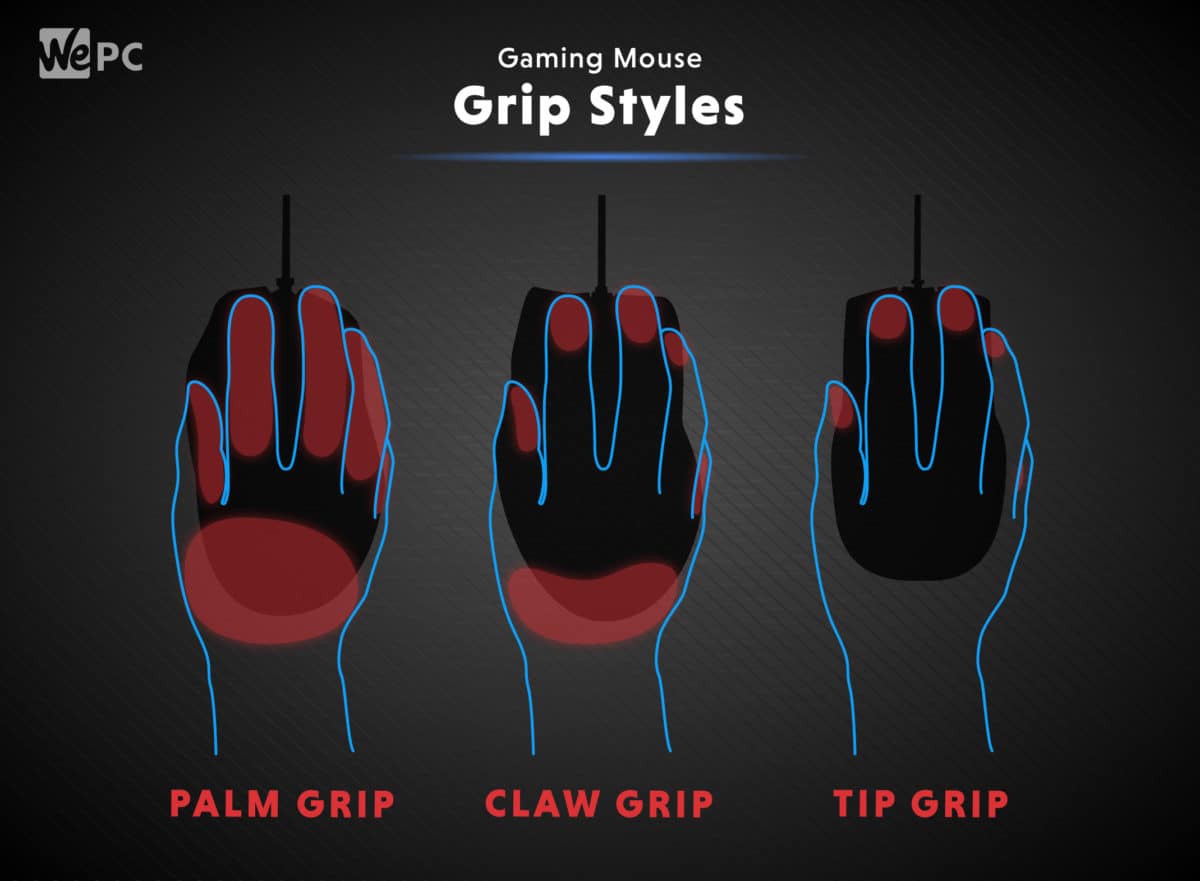
Weight
Weight has become much more important over the past five years, mainly because mouse manufacturers now have the resources to make mice lighter without losing out on any gaming performance. Having a lighter mouse theoretically allows you to become more agile, react faster to enemies, and practice for longer.
As a general rule, we usually recommend lighter mice (Cooler Master MM711/ Roccat Kone Pure Ultra) for competitive FPS titles such as CS2. Other game styles don’t rely on reaction time and aim as much, so weight doesn’t play a key role.
Latency
When referencing mice, latency refers to how long it takes for the mouse to send a specific command (mouse 1 click, for example) to the PC and be registered. Now, while the difference between today’s wired and wireless technology is less than noticeable, it still plays a major role in our decision-making process.
Most of the time, wired mice showcase lower latency as the signal gets sent via a physical wire. On the flip side, because wireless uses wireless technology, the signal can be delayed or interfered during its course to the PC.
While this probably won’t affect many of us playing casual games, professional esports players need every advantage they can get – almost always opting for a wired connection.
IPS
IPS stands for inches per second and refers to how well the sensor can track the movements you make. For example sake, a mouse that comes equipped with a 400 IPS tracking accuracy, theoretically has the ability to track your movements up to 400 inches per second. Basically, the higher the number, the more accurate the sensor is at high speeds.
Wired vs wireless – which is better for gaming?
Ultimately, choosing whether to go for a wired or wireless gaming mouse comes down to your specific needs – and how much you prioritize raw gaming performance. Nine times out of ten, the wired gaming mouse is going to provide better gaming performance at the end of the day – albeit only marginally. They come equipped with lower input lag, usually offer a lighter build design, and will probably save you a few quid at the checkout too.
Having said that, if you prioritize desk tidiness, versatility, and user experience instead, then absolutely go for a wireless gaming mouse. As you can see from the comparison between the best wired vs best wireless gaming mice, there really isn’t a great deal separating the two types of mice. The only main factor nowadays is the price difference between the two, with wireless being much more expensive.
So, if you prioritize desk tidiness and versatility but still want a great gaming experience, there is literally no better time to buy a wireless gaming mouse. Just be ready to fork out for it.
Gaming mice recommendations
By now, you’ve probably concluded which type of mouse is best going to suit your needs. That being said, below are some brief snippets from a couple of the best wired and wireless mice that we’ve reviewed over here at WePC.
What we had to say about the Razer Viper Ultimate wireless gaming mouse
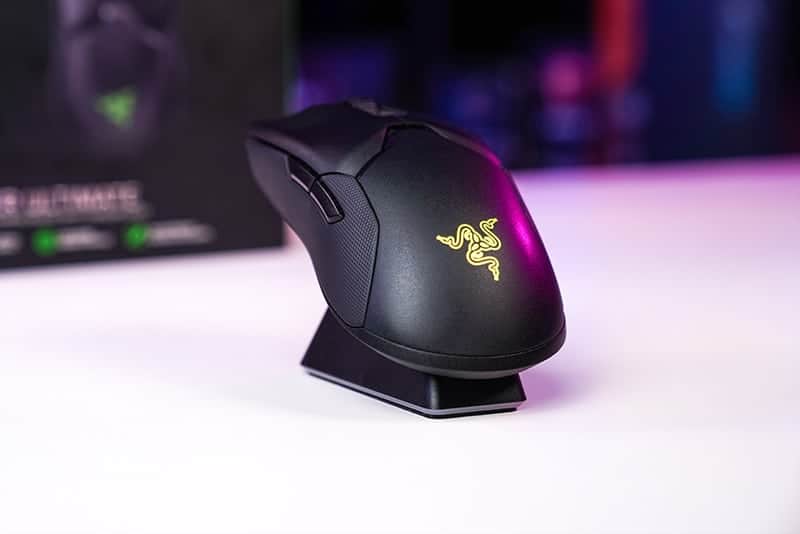
The Viper Ultimate benefits from a cleverly designed charging dock and supremely comfortable ambidextrous design. Its light weight of 2.7oz/74g makes it a great choice for general gaming, especially FPS where speed is king.
Check out our full Razer Viper Ultimate wireless gaming mouse review for more info on this great mouse.
What we had to say about the Glorious Model O- wired gaming mouse
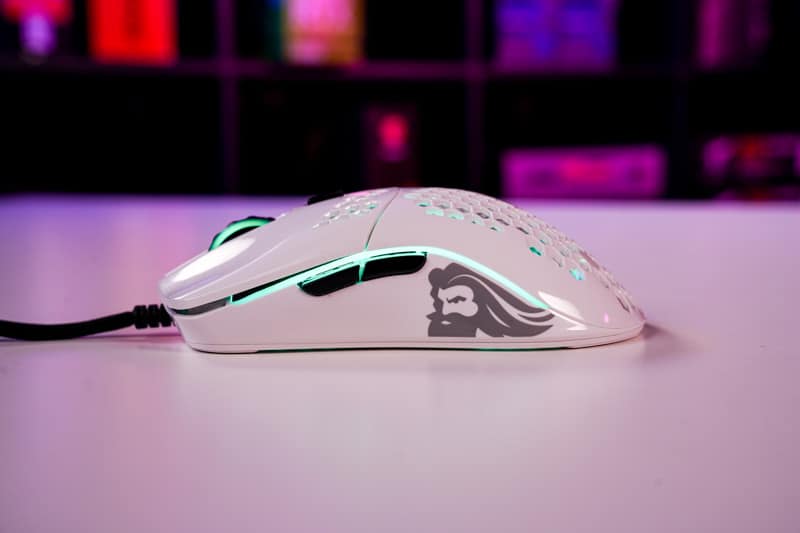
The Model O- offers thoughtful design choices and some top-tier gaming performance with a disproportionately low price that makes it one of the best value for money propositions we’ve seen in a gaming mouse.
Why not mosey on over to our full Glorious PC Gaming Race Model O- gaming mouse review for more info on what we think is the king of wired gaming mice.
More gaming mouse pages
We have a whole bunch of other mouse guides that help when it comes to your next gaming mouse purchase. Below are some of our most popular, all providing great advice in its specific category. Our you can feel free to visit our gaming mouse hub.
- Best wireless Gaming Mice
- Best under $50
- Best under $30
- Best gaming mouse & keyboard combo
- Best USB-C mouse
- Best FPS gaming mouse
- Best MMO gaming mouse
Wired vs wireless gaming mouse FAQs
Are wired mice more reliable?
Wired mice are more reliable simply due to not worrying about any interference, latency, or connectivity issues. That being said, the wire itself could wear over time if you are putting too much stress on it.
Do pro gamers use wired or wireless mice?
Although wired mice used to be the preference thanks to better responsiveness, this dynamic has somewhat shifted in recent times as high-end wireless gaming mice offer minimal latency which is unnoticeable.
Wireless mice have improved to the point where the cable drag or cable interference is more of a concern for professional gamers, so many of them now opt for wireless.
Final word
So, there you have it, our comprehensive guide to wired vs wireless gaming mice. We hope our breakdown has made choosing your next mouse purchase that little bit easier.
Ultimately, choosing between a wired and wireless gaming mouse in today’s market comes down to one key factor – price. At the top end of the price spectrum, the differences are few and far between, with wireless mice now providing a very good account of themselves. However, if you haven’t got the cash to splash out on an expensive model, you may want to consider wired if gaming performance is your main priority.

